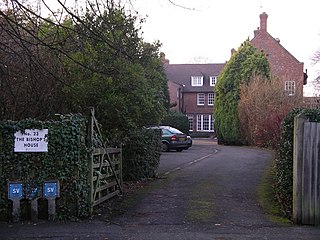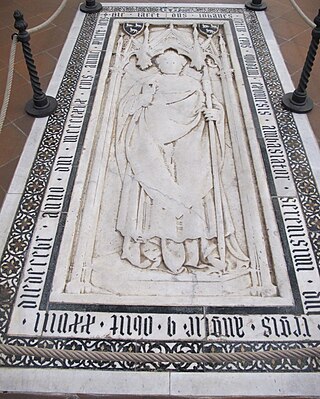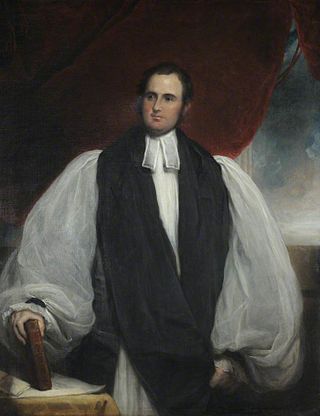Related Research Articles
Athelm was an English churchman, who was the first Bishop of Wells, and later Archbishop of Canterbury. His translation, or moving from one bishopric to another, was a precedent for later translations of ecclesiastics, because prior to this time period such movements were considered illegal. While archbishop, Athelm crowned King Æthelstan, and perhaps wrote the coronation service for the event. An older relative of Dunstan, a later Archbishop of Canterbury, Athelm helped promote Dunstan's early career. After Athelm's death, he was considered a saint.

The Bishop of Coventry is the ordinary of the Church of England Diocese of Coventry in the Province of Canterbury. In the Middle Ages, the Bishop of Coventry was a title used by the bishops known today as the Bishop of Lichfield.
Nothhelm was a medieval Anglo-Saxon Archbishop of Canterbury. A correspondent of both Bede and Boniface, it was Nothhelm who gathered materials from Canterbury for Bede's historical works. After his appointment to the archbishopric in 735, he attended to ecclesiastical matters, including holding church councils. Although later antiquaries felt that Nothhelm was the author of a number of works, later research has shown them to be authored by others. After his death he was considered a saint.
Jænberht was a medieval monk, and later the abbot, of St Augustine's Abbey, Canterbury, who was named Archbishop of Canterbury in 765. As archbishop, he had a difficult relationship with King Offa of Mercia, who at one point confiscated lands from the archbishopric. By 787, some of the bishoprics under Canterbury's supervision were transferred to the control of the newly created Archbishopric of Lichfield, although it is not clear if Jænberht ever recognised its legitimacy. Besides the issue with Lichfield, Jænberht also presided over church councils in England. He died in 792 and was considered a saint after his death.

Æthelhard was a Bishop of Winchester then an Archbishop of Canterbury in medieval England. Appointed by King Offa of Mercia, Æthelhard had difficulties with both the Kentish monarchs and with a rival archiepiscopate in southern England, and was deposed around 796 by King Eadberht III Præn of Kent. By 803, Æthelhard, along with the Mercian King Coenwulf, had secured the demotion of the rival archbishopric, once more making Canterbury the only archbishopric south of the Humber in Britain. Æthelhard died in 805, and was considered a saint until his cult was suppressed after the Norman Conquest in 1066.
Feologild was a medieval English clergyman. He was probably elected Archbishop of Canterbury, although controversy surrounds his election. Some modern historians argue that instead of being elected, he was merely an unsuccessful candidate for the office. He died soon after his consecration, if indeed he was consecrated.
William Booth or Bothe was Bishop of Coventry and Lichfield from 1447 before becoming Archbishop of York in 1452 until his death in 1464.
Hygeberht was the bishop of Lichfield from 779 and archbishop of Lichfield after the elevation of Lichfield to an archdiocese some time after 787, during the reign of the powerful Mercian king Offa. Little is known of Hygeberht's background, although he was probably a native of Mercia.

The Bishop of Lincoln is the ordinary of the Church of England Diocese of Lincoln in the Province of Canterbury.
Putta was a medieval Bishop of Rochester and probably the first Bishop of Hereford. Some modern historians say that the two Puttas were separate individuals.
Diuma was the first Bishop of Mercia in the Anglo-Saxon Kingdom of Mercia, during the Early Middle Ages.
Headda was a medieval Bishop of Lichfield.
Witta was a medieval Bishop of Lichfield. He was consecrated in 737 and died between 749 and 757.
John Burghill was a medieval Bishop of Llandaff and Bishop of Coventry and Lichfield.

John Catterick was a medieval Bishop of St David's, Bishop of Coventry and Lichfield, and Bishop of Exeter.
Reginald Boulers was a medieval Abbot of Gloucester, Bishop of Hereford and Bishop of Coventry and Lichfield.

Ceolwulf was a medieval Bishop of Lindsey.
John Arundel was a medieval Bishop of Coventry and Lichfield and Bishop of Exeter.
Torhthelm was a medieval Bishop of Leicester.

James Bowstead (1801–1843) was an Anglican clergyman who served in the Church of England as the Bishop of Sodor and Man (1838–1840) and Bishop of Lichfield (1840–1843).
References
- Fryde, E. B.; Greenway, D. E.; Porter, S.; Roy, I. (1996). Handbook of British Chronology (Third revised ed.). Cambridge, UK: Cambridge University Press. ISBN 0-521-56350-X.